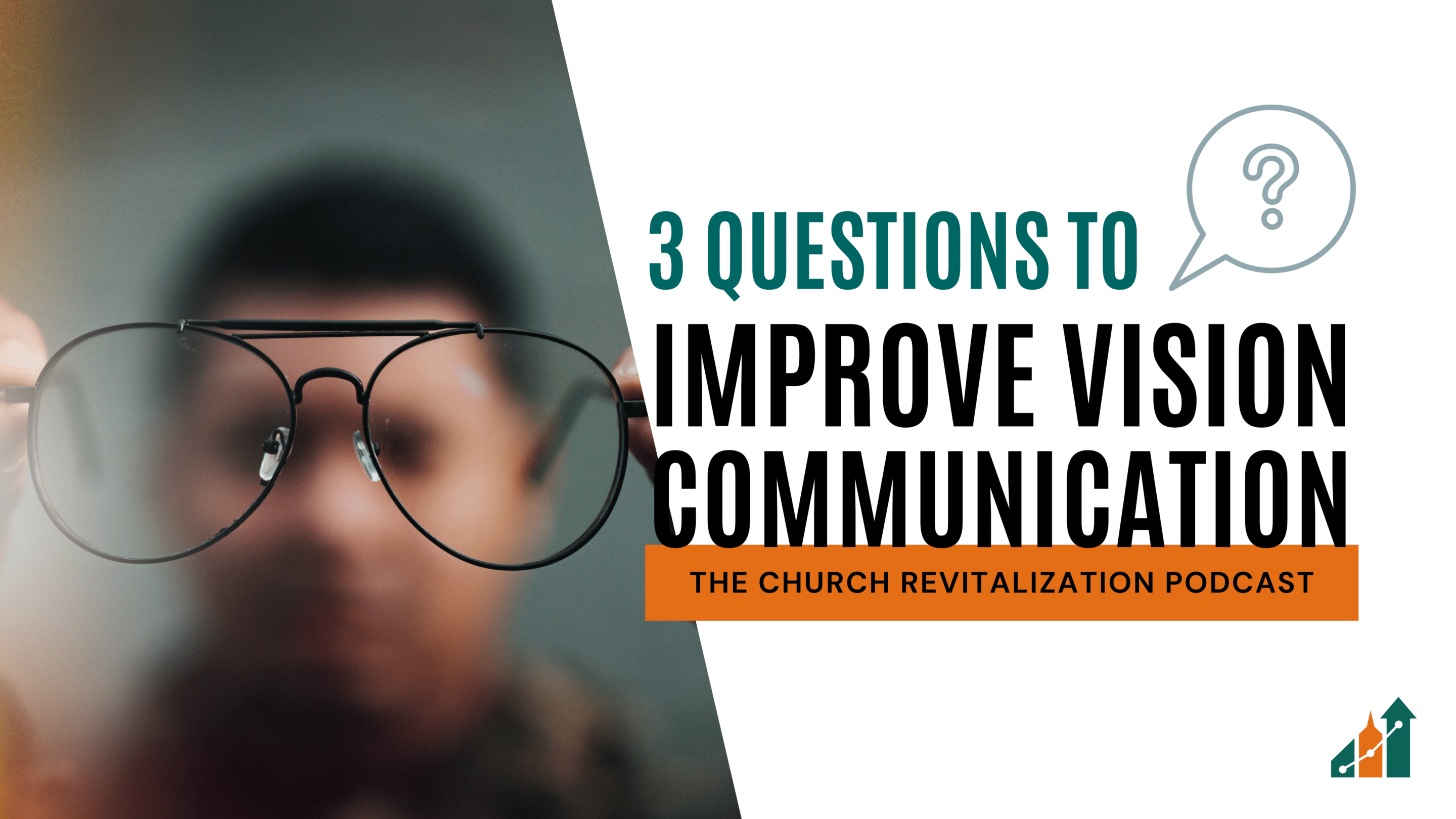The Church Revitalization Podcast – Episode 135
3 Questions to Improve Vision Communication in Your Church
Vision is a challenge for most churches because it’s one of the most misunderstood aspects of ministry. We don’t pretend it’s not tough. It’s much easier to talk about what the next bible study is about than the difference your church will make in your city five years from now. Just because it’s hard doesn’t mean you get to skip it though. It’s too important.
This week’s episode of the Church Revitalization Podcast is not a deep dive into vision development itself. For more on vision components, check out 7 Vision Failures Holding Churches Back. This week, we’re talking about getting the message out – how to communicate vision.
Lots of churches have put effort into vision development, but then find that it fizzles out in a short amount of time. One of the issues may have been a failure to develop strategies for success, but often we see a basic lack of understanding in communicating the vision to begin with. Below are three simple questions to ask of your church’s vision plan that can help move you forward.
Subscribe below to never miss an episode.
What is the Visionary Message?
You first have to have settled on what your true vision is, and it should be pretty specific. You should be able to tell it apart from some worthy call to action you may have had in last week’s sermon. (Although, hopefully that call to action would drive towards vision accomplishment). Will your church become the place in your city that everyone knows is all about families or are you striving towards 1,000 Gospel conversations with non-believers in the next three years?
Vision is a multi-faceted diamond. When it’s communicated, light is shined on it. What happens when light hits a diamond? It’s brilliant! People want to look at it and be closer to it. When you’re trying to figure out how to communicate vision, ask what is the visionary message.
Who Communicates the Vision?
The simple answer is that vision is communicated from the top down, initially. However, the answer to this question changes over time. It expands. Vision should be developed at the senior-leadership levels of the church, so naturally, that’s where the communication begins.
This assumes several important things. First, it assumes that the vision is clear to all those involved in its development. It should be written down so that everyone involved agrees on the final product. Second – senior leaders need to understand the necessity of being continual vision communicators. Third – senior leaders need to understand the necessity of being continual vision defenders. There will be detractors, either by misunderstanding, (a fixable issue) or by disagreement (a potentially unfixable issue).
How Should Hearers Respond to the Vision?
“Do not merely listen to the word, and so deceive yourselves. Do what it says. Anyone who listens to the word but does not do what it says is like someone who looks at his face in a mirror and, after looking at himself, goes away and immediately forgets what he looks like. But whoever looks intently into the perfect law that gives freedom, and continues in it—not forgetting what they have heard, but doing it—they will be blessed in what they do.” – James 1:22-25
Vision is not equal to scripture, but vision hearers should become vision casters! Those facets of your vision diamond are all the many ways that the body of Christ will work together for vision progress and accomplishment. When a Sunday school teacher or student small group leader looks at the vision, they should see their ole reflected back from their facet. They, in turn, will talk about the vision more specifically from their own context of involvement.
The goal is to turn your whole church into vision casters, not vision hearers. As the Lord adds to your number daily those being saved (Acts 2:47) they’ll hear the vision from those in the church closest to them while also hearing it from senior leaders.
Mission and vision are unity and momentum builders in every church. When you’re wondering how to communicate vision, ask yourself these three questions. Don’t forsake the time investment in setting your church up for greater Gospel effectiveness.
Watch this episode on YouTube


A.J. Mathieu is the President of the Malphurs Group. He is passionate about helping churches thrive and travels internationally to teach and train pastors to lead healthy disciple-making churches. A.J. lives in the Ft. Worth, Texas area, enjoys the outdoors, and loves spending time with his wife and two sons. Click here to email A.J.

